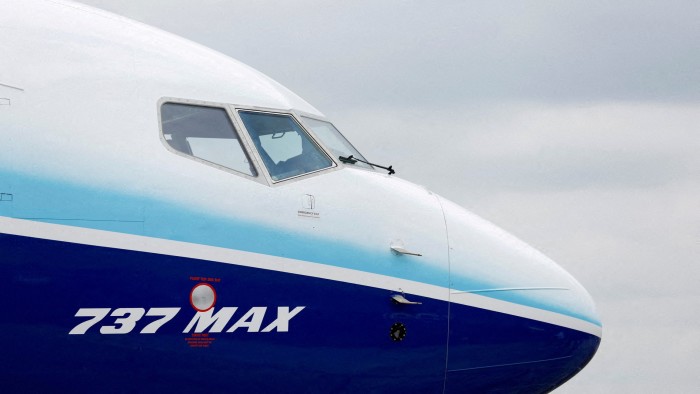Unlock the Editor’s Digest for free
Roula Khalaf, Editor of the FT, selects her favourite stories in this weekly newsletter.
Boeing chief executive Kelly Ortberg said he was working with the Trump administration to ensure the company was not “an unintended consequence” of the trade war with China, suggesting countries buy more of its planes to reduce their trade deficits with the US.
In an interview with the Financial Times, Ortberg, who took the helm in August, also said the launch of a new aircraft expected to replace its best-selling 737 Max was not an immediate priority, saying the “market is not ready now”.
As America’s largest exporter, Boeing has been caught in the crossfire of Donald Trump’s volatile trade war, which has upended the aerospace industry’s decades-old tariff-free status, putting aircraft deliveries at risk and straining supply chains.
Boeing was poised to restart deliveries of new planes to Chinese airlines next month, following a deal Washington struck with Beijing two weeks ago to reduce tariffs. But on Friday President Donald Trump accused China of backtracking on the agreement, raising the possibility of a Chinese response.
The relationship between the countries is “dynamic,” Ortberg said, adding that he had learned not to “hyperventilate, because it’s probably going to change tomorrow”.
“In the end, this is going to result in new trade agreements — that will be OK,” he said.
“It’s just managing through this uncertainty period . . . So we’re just trying to stay flexible, make sure that we’re communicating with the administration so that as they negotiate these things, we don’t [become] an unintended consequence.”
The trade war has come at a critical time for the industry veteran who in April described 2025 as Boeing’s “turnaround year”. Ortberg, a former chief executive of Boeing supplier Rockwell Collins, faced the daunting task of rehabilitating the aerospace and defence group after a series of safety and manufacturing crises.
Just weeks into the job, Ortberg was forced to raise more than $21bn in new equity to shore up Boeing’s balance sheet, as well as confronting a strike by its largest union that halted production of the 737 Max.
Ortberg said Boeing would pay “less than $500mn . . . for the year” on imports needed to build the company’s products, a cost Boeing hopes will disappear after the negotiation of bilateral agreements. Retaliatory tariffs from countries such as China present a greater threat, as they could prompt airlines to refuse delivery.
Nevertheless, Ortberg said he was confident the geopolitical tensions would not delay Boeing’s recovery.
The company has a strong backlog of orders, he said, adding that for countries wanting to even a trade imbalance with the US, aircraft are “a very large dollar item, so they’d be a great opportunity for rebalancing”.
Boeing’s recovery, said Ortberg, was progressing with an initial focus on stabilising the company. The plane maker is nearing production of 38 737 Maxes per month, the cap set by the US Federal Aviation Administration after last year’s mid-air blowout of a door panel. Boeing must secure regulators’ approval to build narrow-body aircraft at a higher rate — it is aiming for 42 per month — to generate cash in the second half of the year.
“Once we get to that and I have stable performance on our government portfolio,” said Ortberg, “I’ll claim victory on the stabilisation part of the process”.
“You can call that turning the corner.”
Ortberg damped expectations that Boeing would launch a more fuel-efficient successor to the Max any time soon, despite concerns that airlines will struggle to meet their sustainability goals.
Boeing, he said, was not in a financial position to invest in a new plane programme. The market was not ready either, with airline customers still struggling with the durability of current engine technology. Airlines, he said, “certainly wouldn’t want to jump to something riskier and more difficult”.
The company would be ready, he said, when “we’ve got the resources, the technology and the ability to do that”.
“It’s not today, it’s not tomorrow.”
Separately, Ortberg said he expected Elon Musk would probably step back away from his day-to-day involvement in building a new Air Force One, now that he had left the Trump administration. The billionaire earlier this year began advising Boeing on completing two long-delayed new jets for the US president, prompting Trump to accept a $400mn gift of an alternative jet by Qatar.
Some of the requirements for the aeroplane were nearly impossible to achieve, Ortberg said, and Musk helped Boeing “work with the customer to get some of those requirements changed to more reasonable requirements that . . . still met the mission of the aircraft.”
Read the full article here




